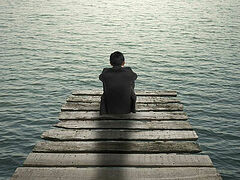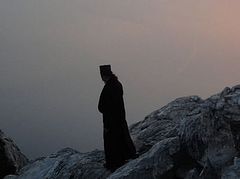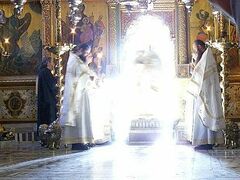Even today there are God’s people—holy people. They feel and see God, and hear the voice of Christ in their hearts. Of course, this is only when their hearts are cleansed by the Holy Spirit.
By the grace of God, I was vouchsafed to meet some of these saints, in Cyprus and other places. I’ll tell you about one of them.
He’s a monk. A humble monk. A crucified monk. I knew him before I became a monk myself. We’re the same age, but he showed diligence and spiritually blossomed. I ascended to the episcopal throne, but he descended to Christ’s humility, to extreme humility. Only there does the Lord reveal Himself. And he described to me how he saw the Uncreated Light of the Holy Trinity. But I was ignorant then and couldn’t understand him, so he said to me:
Despota, to understand what the Light of Christ is like, imagine some people diving in the water, or rather, swimming and diving there, in the depths of the sea. They feel the waters of the depths embracing them, engulfing them, and enveloping them. They feel like they’re swimming in the boundless waters of the sea. This is similar to the Divine Light, when a man is accounted worthy to enter into it. It’s an endless, infinite light, having no beginning. As the Lord has neither beginning nor end, so His Light. When a man enters into this Light, he feels with his entire body how the Light embraces and envelops him.
“But how can you swim in this light?! How can you enter into it and move around in it?!”
“This Light,” he said, “is filled with information. You can ask this Light different questions and it will answer them—questions of an experiential, scientific, ethical, religious, spiritual nature. And you will be filled with such answers that your mind cannot comprehend, that your mouth cannot speak; your mouth can’t pronounce them. But little by little, they are felt, understood, and perceived by the heart.”
I was impressed by what he told me.
“Both knowing God and beholding the Light happen gradually.”
Likewise, there is no end to spiritual growth, neither in this life nor in life after death. That’s why the Creed says: “Whose Kingdom shall have no end.”





